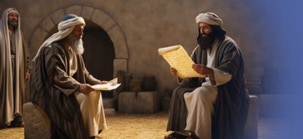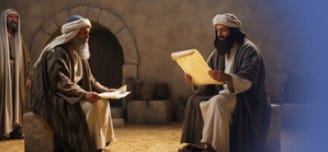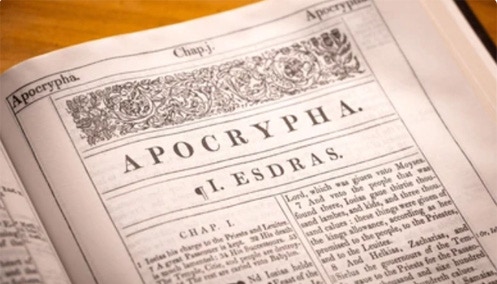


Common Objections
Common Objections
Catholic Outlook
Catholic Outlook

Catholic Outlook
Common Objections
Common Objections
__________ Recent Additions __________
Catholic Outlook
Catholic Outlook
__________ The “Apocrypha” __________
“St. Augustine wrote a book late in his life called ‘Retractions’ where he renounced his support for the Apocrypha.”
Gary Hoge

Although the book in question is sometimes called “Retractions,” it’s usually called “Retractations.” It was not so much an effort to correct past mistakes (though it did do that) as it was an attempt to comment briefly on the contents of his earlier writings, and to describe the circumstances that prompted him to write them. Now, there were two books in which Augustine had unequivocally supported the canonicity of the so-called “Apocrypha” (i.e., The City of God and On Christian Doctrine). In his comments on The City of God in the Retractations, Augustine does not, as far as I know, mention the canon of Scripture. However, he does mention it briefly in his comments regarding On Christian Doctrine, in which he wrote,
In the second book, I made a mistake as to the authorship of the book commonly called the Wisdom of Solomon. For I have since learnt that it is not a well-established fact, as I said it was, that Jesus the son of Sirach, who wrote the book of Ecclesiasticus, wrote this book also: on the contrary, I have ascertained that it is altogether more probable that he was not the author of this book. Again, when I said, “The authority of the Old Testament is contained within the limits of these forty-four books,” I used the phrase “Old Testament” in accordance with ecclesiastical usage. But the apostle seems to restrict the application of the name “Old Testament” to the law which was given on Mount Sinai.1
Now, it should be obvious that this is hardly a “renunciation” of his belief in the inspiration of the deuterocanonical books. Augustine does not modify his belief that the Old Testament comprises forty-four books. He merely notes that he was wrong about the authorship of one of those books, and he comments on his use of language. He tells us that he used the term “Old Testament” to refer to a collection of books (a collection that includes the deuterocanonical books), not to the Old Covenant itself.
Also, if Augustine did intend to renounce his previous acceptance of the deuterocanonical books as Scripture, it is strange indeed that in the very same book of Retractations, he defended the practice of prayer for the dead by writing,
In the books of the Maccabees we read of sacrifice offered for the dead. But even if it were nowhere at all read in the Old Scriptures, not small is the authority, which in this usage is clear, of the whole Church, namely, that in the prayers of the priest which are offered to the Lord God at His altar, the Commendation of the dead has also its place.2
If Augustine no longer considered the books of the Maccabees to be inspired Scripture, why did he refer to them as part of the “Old Scriptures”?
Finally, unless it is asserted that individual Christians like Augustine and Jerome were inspired by God, reliance on them to discredit the deuterocanonical books misses the whole point. The question is not, “Did all Christians everywhere accept these books?” The answer to that question is, of course, no. Most did, but some did not. But if unanimous approval is our standard, then we’re going to have to get rid of Hebrews, James, and 2 Peter, too, among others, because Christians didn’t unanimously accept those books either.
It seems to me that the ultimate question is really, “Did God reveal the list of books that make up our Bible, or is the list just a guess on our part?” If God revealed the list, then when, where, and how did he do so? If he revealed it through the consensus of the early Christians, then the deuterocanonical books are Scripture, because most of the early Christians accepted them as such:
In the first two centuries . . . the Church seems to have accepted all, or most of, these additional books as inspired and to have treated them without question as Scripture. Quotations from Wisdom, for example, occur in 1 Clement and Barnabas . . . Polycarp cites Tobit, and the Didache [cites] Ecclesiasticus. Irenaeus refers to Wisdom, the History of Susannah, Bel and the Dragon, and Baruch. The use made of the Apocrypha by Tertullian, Hippolytus, Cyprian and Clement of Alexandria is too frequent for detailed references to be necessary.3
If God revealed the list through the institutional Church, then the deuterocanonical books are still Scripture, because the institutional Church officially accepted these books as Scripture at the councils of Hippo (393), Carthage (397, 419), Florence (1442), Trent (1546), and Vatican I (1869). Also, the councils of II Nicea (787), IV Constantinople (869), IV Lateran (1215), and Vienne (1311), although they did not produce a list of Scripture, did quote from these books as Scripture.
__________
1 Retractations, Book II, Chap. 4.
2 Retractations, Book II. Chap. 64.
3 J.N.D. Kelly, Early Christian Doctrine, (New York: Harper & Row, 1960), 53-4.
Copyright © 2024 Catholicoutlook.me
MENU